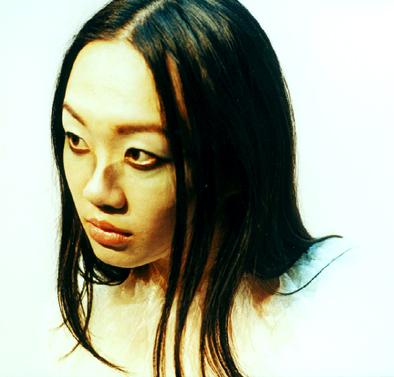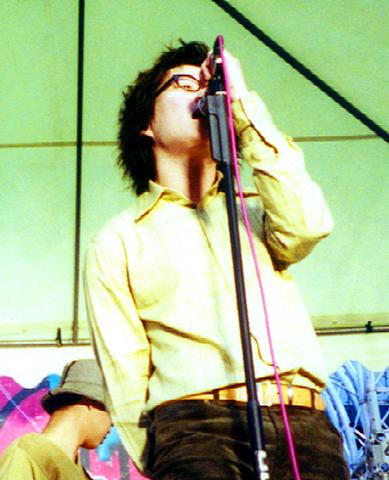Because registration for bands, vendors and artists for this year's Spring Scream began only earlier this week, the concert's organizers are not yet able to provide a full list of the acts that will perform. So Taipei Times has tracked down some bands that have played at previous Spring Screams and that hope to make the annual pilgrimage between April 5 and April 8 to Liu-fu Ranch (
Psychedelic Kindergarten (迷幻幼稚園)

PHOTO COURTESY OF PSYCHEDELIC KINDERGARTEN
Psychedelic Kindergarten is a goth-rock band with a touch of punk and modern rock. On stage, band members paint their faces black and white, wear black, and adorn themselves with other goth paraphernalia. Since Taiwan's goth scene is still barely embryonic, the band's members all lead double lives, with music fulfilling the Mr Hyde side of their personas. As for Dr Jekyll, the resounding example is Ah-chang (

PHOTO COURTESY OF CAPTAIN PEANUT
What Psychedelic Kindergarten (迷幻幼稚園) and Editec
Where Underworld (地下社會), 45 Shihda Rd. B1 (師大路145號B1)
When March 14, 10pm
Tickets NT$250
Captain Peanut
Over the last two years, Captain Peanut has shifted its focus from modern rock to bossa nova. The six-man group, which adds brass instruments to the standard rock ensemble, said they simply got fed up with being another underground rock band, said vocalist Abee (阿比). "Everyone's getting heavier and heavier," he said, referring to last year's Spring Scream, "and we said to ourselves we just can't do that." So the band, whose members found themselves listening to more and more jazz, began to take inspiration from the likes of Antonio Carlos Jobim and Stan Getz. But it was just inspiration, not a prefab plan. "We're not really pure bossa nova" said Abee, who says that the group was also listening to lounge music and Shibuya, a new type of Japanese musical fusion. "In Shibuya, you have samba, mambo, bossa nova, and they're all mixed with other things," he said. Sometimes that includes disco, rock or even grunge. In performance, Captain Peanut often transforms the stage into a miniature carnival, inviting friends and audience members onto the stage to play small percussion instruments. Though they have attended Spring Scream in the past, Abee worries that they may not be able to make it this year, as they are busy recording an album. The band will be playing tomorrow night at Zeitgeist with Darcy.
Nicole Darcy
According to rock/folk singer-songwriter Nicole Darcy: "After I went to India for the third time to see the Dalai Lama in 1991, I decided to get a guitar, move back to Taiwan and start singing." Ever since, she has been living in Tainan, where she composes songs and is fairly famous as the girl who walks around barefoot. Most songs are in Mandarin. Darcy, now 38, said she chose the language out of a combination of desires to connect with the local community and take something with her when she eventually leaves Taiwan, which she may do next year. She says that recently, when she returns to Minneapolis, Minnesota, she gets plenty of gigs on the basis of her Chinese songs. She recalls that her first major gig, however, was the first Spring Scream in 1995, and plans to play again this year. In addition to a show tomorrow at Zeitgeist, Darcy will also perform at the Underworld on March 13 and at Witch House on March 17 (see listings for details).
What Captain Peanut and Nicole Darcy
Where Zeitgeist (聖界), 122 Chunghsiao E. Rd., Sec. 2, B1 (忠孝東路二段122號B1)
When Tomorrow, 9pm
Tickets NT$250
For more information on registration, camping, transportation or other news surrounding Spring Scream, check: http://www.springscream.com.

On April 26, The Lancet published a letter from two doctors at Taichung-based China Medical University Hospital (CMUH) warning that “Taiwan’s Health Care System is on the Brink of Collapse.” The authors said that “Years of policy inaction and mismanagement of resources have led to the National Health Insurance system operating under unsustainable conditions.” The pushback was immediate. Errors in the paper were quickly identified and publicized, to discredit the authors (the hospital apologized). CNA reported that CMUH said the letter described Taiwan in 2021 as having 62 nurses per 10,000 people, when the correct number was 78 nurses per 10,000

As we live longer, our risk of cognitive impairment is increasing. How can we delay the onset of symptoms? Do we have to give up every indulgence or can small changes make a difference? We asked neurologists for tips on how to keep our brains healthy for life. TAKE CARE OF YOUR HEALTH “All of the sensible things that apply to bodily health apply to brain health,” says Suzanne O’Sullivan, a consultant in neurology at the National Hospital for Neurology and Neurosurgery in London, and the author of The Age of Diagnosis. “When you’re 20, you can get away with absolute

May 5 to May 11 What started out as friction between Taiwanese students at Taichung First High School and a Japanese head cook escalated dramatically over the first two weeks of May 1927. It began on April 30 when the cook’s wife knew that lotus starch used in that night’s dinner had rat feces in it, but failed to inform staff until the meal was already prepared. The students believed that her silence was intentional, and filed a complaint. The school’s Japanese administrators sided with the cook’s family, dismissing the students as troublemakers and clamping down on their freedoms — with

As Donald Trump’s executive order in March led to the shuttering of Voice of America (VOA) — the global broadcaster whose roots date back to the fight against Nazi propaganda — he quickly attracted support from figures not used to aligning themselves with any US administration. Trump had ordered the US Agency for Global Media, the federal agency that funds VOA and other groups promoting independent journalism overseas, to be “eliminated to the maximum extent consistent with applicable law.” The decision suddenly halted programming in 49 languages to more than 425 million people. In Moscow, Margarita Simonyan, the hardline editor-in-chief of the